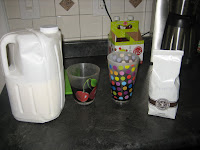Using coffee to combat SAD or why pumpkin lattes can make us happier in November
Who doesn’t love the fall? What’s not to love when turning
leaves are providing a visual feast of saturated reds and yellows, and it’s
absolutely fine to eat an apple cider donut once in a while? People put on
their hiking boots, call in the chimney sweep and embrace the culture of
harvest in all of its pumpkin-and-hayrides glory.
But there’s a downside for people who suffer from seasonal
affective disorder (SAD). As the days get shorter, the lack of sunlight wreaks
havoc on their serotonin and melatonin neurotransmitters. Roughly 6% of
Americans suffer from SAD and another 14% experience the ‘winter blues,’ a less
severe variant of SAD, but very real nonetheless.
Seventy million Americans face a seasonal problem that wasn’t acknowledged as a real condition until 1984 when Dr. Norman
Rosenthal, a clinical psychiatry professor at Georgetown, laid out the
diagnostic criteria for SAD. The DSM-V
categorizes SAD as a modifier—“with seasonal pattern” to recurrent major depressive
disorder. Common treatments include phototherapy, antidepressants and melatonin
supplements.
Wellbutrin X—the only
FDA-approved treatment for SAD
The only FDA-approved treatment for SAD is Wellbutrin XL
(bupropion), which was first marketed by GlaxoSmithKline in 1985 and is now
available as a generic. In
placebo-controlled studies, patients who had been diagnosed with SAD were
started on treatment between September and November. At the end of treatment in
late March, 84% of patients were depression-free---an important outcome because
one of the major concerns around SAD is that it will escalate into a major
depressive episode.
Full Prescribing Information from the Food and Drug Administration is available here.
Full Prescribing Information from the Food and Drug Administration is available here.
Because SAD usually occurs at the same time each year,
starting in mid-to-late fall and ending in spring, it makes sense to anticipate
it. Best to deal with SAD early in the fall, because one day you will wake up
and realize that the sun will be setting at 4 PM, and all you really want to do
is stockpile cookies and rev up the Netflix.
Data: The
coffee-depression connection
I’ve reported several times on the link between drinking
coffee and decreased depression. Ten-year data from the Nurses’ Health Study
showed that drinking 2 to 3 cups of coffee a day decreased the risk of
depression by 15%, and a fourth cup led to even better outcomes. Another study with
more than 86,000 women showed that drinking 2 to 3 cups of coffee per day
decreased the risk of suicide by two-thirds.
However, it really doesn’t take 3 cups of coffee a day to
help you feel better. According to a study published in the Proceedings of the National Academy ofMedicine in 2015, the amount of caffeine found in one cup of coffee can
improve mood, decrease sleepiness, improve memory and make it easier to deal
with stress.
Coffee as stress
reliever
The takeaway: Just grabbing a cup of coffee can help combat
the onset of moodiness for people with SAD. I am not suggesting that coffee is
a replacement for pharmacologic support---that’s something best dealt with by a
medical doctor. However, all evidence points to coffee’s utility as a mood booster
and as a way to combat stress.
Caffeine has a well-known mechanism of action: By blocking
adenosine receptors, it short-circuits the body’s sleep-activation mechanism.
The same MOA is responsible for improving mood and memory, while also making it
easier to handle stress---the bogeyman that can ruin lives. Coffee stops the
body’s natural deterioration mechanisms from kicking in.
I drink coffee because I like it and I know it’s good for
me, but around this time of year, my coffee-drinking becomes more intentionally
utilitarian. I like pumpkins and little goblins, and doing leaf-decoupage
projects with my kindergartener. But I hate getting the blues and it happens
almost every year. This year, however, I’m ready. Drink up!





Comments